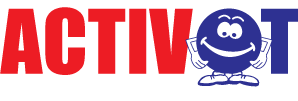ActivOT occupational therapists are members of Australian Health Practitioner Regulation Agency (AHPRA) and bound by a code of conduct.
In short:
“The ethos of the occupational therapy profession and its practice requires its members to discharge their duties and responsibilities, at all times, in a manner which professionally, ethically, and morally compromises no individual with whom they have professional contact, irrespective of that person’s position, situation or condition in society.”
ActivOT therapy assistants abide by the same code of conduct under supervision of occupational therapists.
Principles for conduct
The following eleven principles for conduct are set out by AHPRA’s National Boards’ and are expectations that ActivOT practitioners must observe:
Principle 1 – Put patients first – Safe, effective and collaborative practice
Practitioners should practise safely, effectively and in partnership with patients and colleagues, using patient-centred approaches, and informed by the best available evidence to achieve the best possible patient outcomes.
Principle 2 – Aboriginal and Torres Strait Islander health and cultural safety
Practitioners should consider the specific needs of Aboriginal and Torres Strait Islander Peoples and their health and cultural safety, including the need to foster open, honest and culturally safe professional relationships.
Principle 3 – Respectful and culturally safe practice for all
Respectful, culturally safe practice requires practitioners to have knowledge of how their own culture, values, attitudes, assumptions and beliefs influence their interactions with people and families, the community and colleagues. Practitioners should communicate with all patients in a respectful way and meet their privacy and confidentiality obligations including when communicating online.
Principle 4 – Working with patients
Basing relationships on respect, trust and effective communication enables practitioners to work in partnership with patients. Practitioners should maintain effective and professional relationships with their patients and provide explanations that enable patients to understand and participate in their care.
Principle 5 – Working with other practitioners
Good relationships with colleagues and other practitioners strengthen the practitioner-patient relationship, collaboration and enhance patient care. Good relationships require health care to be free of discrimination, bullying and harassment.
Principle 6 – Working within the healthcare system
Practitioners have a responsibility to contribute to the effectiveness and efficiency of the healthcare system and use resources wisely.
Principle 7 –Minimising risk to patients
Good practice involves putting patient safety, which includes cultural safety, first. Practitioners should minimise risk by maintaining their professional capability through ongoing professional development and self-reflection and understanding and applying the principles of clinical governance, risk minimisation and management in practice.
Principle 8 – Professional behaviour
Practitioners must display a standard of professional behaviour that warrants the trust and respect of the community. This includes practising ethically and honestly.
Principle 9 –Maintaining practitioner health and wellbeing
It is important for practitioners to maintain their health and wellbeing. This includes seeking an appropriate work–life balance.
Principle 10 – Teaching, supervising and assessing
Practitioners should support the important role of teaching, supervising and mentoring practitioners and students in order to develop the health workforce.
Principle 11 – Ethical research
Practitioners should recognise the vital role of ethical and evidence-based research to inform quality healthcare and policy development, conduct research ethically and support the decision-making of research participants.
ActivOT’s commitment to cultural safety for all
ActivOT practitioners strive to offer culturally safe and respectful practices. Our code of conduct means that:
1. We understand that only the participant and their family can determine whether or not care is culturally safe and respectful.
2. We respect diverse cultures, beliefs, gender identities, sexualities and experiences of all people, including our colleagues
3. We acknowledge all the factors that influence health including social, economic, cultural, historical, and behavioural
4. We adopt practices that demonstrate respect for diversity; avoiding bias, discrimination and racism – challenging beliefs based on assumptions about age, gender, ability, race, sexuality, ethnicity, religion or political beliefs
5. We create culturally safe environments to support the rights, dignity and safety of others.
You can access the full code of conduct here
To discuss conduct of ActivOT practitioners, please contact us via connect@activot.com.au
